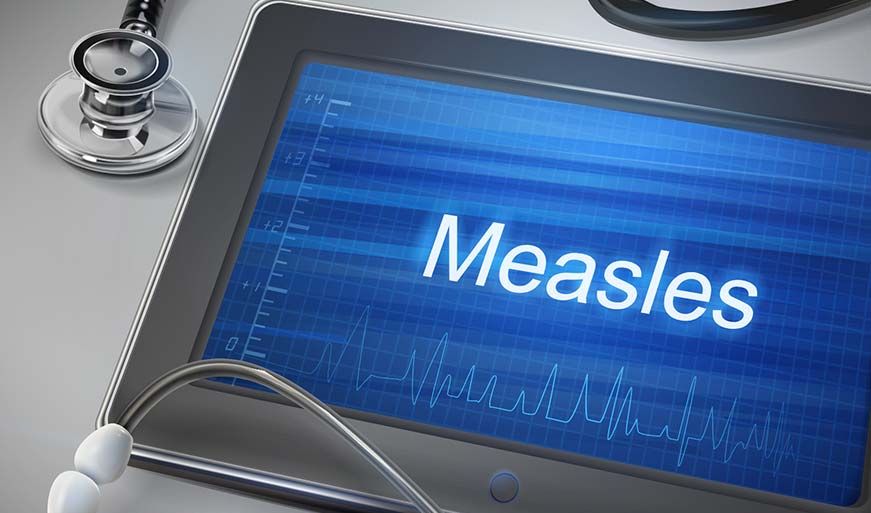Posted by Dr. Eugene Park
The United States is currently witnessing one of the worst measles outbreaks of the past two decades. Between January 1 to May 3, 2019, the Centers for Disease Control and Prevention (CDC) has reported over 800 confirmed Measles cases in 23 states in the United States—the highest number of cases since 19941.
After the launch of the Measles, Mumps, and Rubella (MMR) vaccine in late 1970s, the CDC had declared Measles to be eliminated by 2000. However, in recent years, measles cases have been on the rise. In 2014, 667 cases were reported to the CDC1. This year’s numbers have far surpassed 2014 and the rise in cases can be due to the following key reasons:
- Rise in the number of unvaccinated individuals.
- Measles epidemics abroad
- Improving ease and cost of travel overseas
What are the early symptoms of Measles?
After exposure to measles, symptoms may not begin for 2-3 weeks. Early symptoms resemble the common cold:
- Fever
- Cough
- Runny nose
- Sore throat
- Red eyes
- A rash that starts 4-5 days after the onset of fever
Often these symptoms are similar to and often misunderstood as the common cold or flu. Although measles has historically been considered a pediatric illness, adults who contract measles may have higher rates of serious complications. A few of the complications associated with measles include:
- Diarrhea (most common)
- Ear infection
- Pneumonia – a leading cause of death due to measles
- Encephalitis – Inflammation of brain
- Other neurologic complications
Who is at high risk for Measles complications?
Patient populations considered at higher risk include:
- Infants younger than 12 months
- Pregnant women
- People with weakened immune systems, such as people with HIV or cancer
What should you do if you are concerned you may have measles?
Contact your primary care physician immediately over the phone and identify your concern. You may be asked to wear a mask or schedule an after-hours visit to minimize exposure to others. If you are unsure about your MMR immunization status, make an urgent appointment with your doctor to have your antibody levels checked, or to receive your immunizations.
How is Measles treated?
Measles is a self-limited illness, which means it will improve with time. Like the common cold, medicine to help treat cough and fever may be recommended. Antibiotics have no role in the treatment of measles. If you have been exposed to someone with Measles and you have not received your immunizations, an urgent visit with your physician is recommended to receive a post-exposure vaccine.
Is the MMR vaccine safe?
With the rise of social media and internet, there has been a wide spread of misinformation regarding the safety of vaccinations. This has resulted in increasing rates of unimmunized individuals and the alarming rise in measles cases. Contrary to existing myths about MMR vaccine—such as its alleged correlation with autism2, the vaccine is very safe.
Two doses of the MMR vaccine is thought to confer 97% immunity, which is lifelong. Those who have received only one dose of MMR vaccine and are considered to be high risk should receive a booster. These include people traveling overseas, attending college, living in areas of outbreak, or are healthcare workers.
Side effects of MMR vaccine are mild and uncommon. The most common adverse effect of the vaccine is fever, which starts a week after receiving the vaccine and lasts for a couple of days. Fever should not be mistaken for a symptom of measles. Other adverse effects include allergic reactions, injection site pain, muscle aches.
How can you prevent Measles?
The MMR vaccine is a lifesaving precautionary measure as it provides lifelong immunity. Many individuals, including the very young and infirmed, cannot receive the MMR vaccine. Communities with high rates of immunization can help protect these individuals. This concept is known as Herd Immunity.
Measles is a highly contagious disease, with a 90% transmission rate. The measles virus can live on open surfaces for up to two hours and can be easily transmitted in the air. In addition to being immunized, practicing good hand washing and the use of masks in certain settings can help minimize transmission.
1Centers for Disease Control and Prevention. Measles Cases and Outbreaks. Retrieved from https://www.cdc.gov/measles/cases-outbreaks.html
2World Health Organization. MMR and Autism. Retrieved from https://www.who.int/vaccine_safety/committee/topics/mmr/mmr_autism/en/
 ENGLISH
ENGLISH KOREAN
KOREAN Spanish
Spanish RUSSIAN
RUSSIAN Armenian
Armenian FILIPINO
FILIPINO Chinese (Simplified)
Chinese (Simplified) Chinese (Traditional)
Chinese (Traditional)

최신댓글